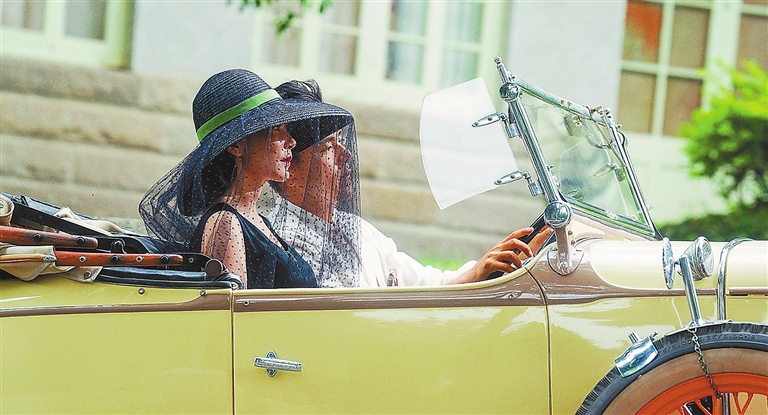
Starring: Sandra Ma, Faye Yu, Eddie Peng, Ning Chang, Fan Wei, Isabella Leong, Zhang Jianing, Yin Fang Director: Ann Hui VETERAN Hong Kong filmmaker Ann Hui, one of Venice’s two Career Golden Lion recipients in 2020 alongside Tilda Swinton, brings prewar Hong Kong to exquisite if restrained life in her latest historical drama, “Love After Love” (“Di Yu Lu Xiang”). This is the veteran Hong Kong New Wave filmmaker’s third adaptation of a work by Chinese-born writer Eileen Chang, whose writings were also the basis for Hui’s “Love in a Fallen City” from 1984 and 1997’s “Eighteen Springs,” as well as another film from the Biennale’s storied history: Ang Lee’s Golden Lion winner “Lust, Caution.” Besides Hui at the helm, the involvement of star cinematographer Christopher Doyle, famous for his collaborations with Wong Kar-wai, and sterling composer Ryuichi Sakamoto (“The Revenant,” “The Last Emperor”) should further help attract the attention of cinephiles. “Love After Love” tells the story of Ge Weilong (Sandra Ma), a young woman from Shanghai who turns up on the doorstep of Madame Liang (Faye Yu), her much richer aunt living the good life in prewar Hong Kong. Ge wants to study in Hong Kong but has no money and is hoping her aunt might help her out. However, Ge’s father and aunt Liang, his sister, aren’t on good terms, with the latter stating that she’d “gladly pay for his coffin” but would not otherwise give him a cent. That she still takes in the girl suggests not a sudden and atypical outpouring of familial love or general pity for an inexperienced young woman, but rather foreshadows something more ominous: Madame Liang — note that name — might see a way she can profit from having the beautiful and somewhat naive young lady in her household, which has been surviving at least partially on the generosity of rich male acquaintances. This kind of speculation about the motives behind characters’ often unexplained decisions and actions and the constant need to read between the lines are the general modus operandi of screenwriter Wang Anyi (“Everlasting Regret,” “Temptress Moon”), who here adapts Chang’s short story “Aloeswood Incense: The First Brazier.” This creates a kind of dual layering. The surface of “Love After Love” offers a beautifully gilded and almost overly formal story about the sorrows of a young woman who doesn’t seem to do a lot of studying and who pays a high price for her innocence and gullibility. This stratum’s narrative mechanics function like a classical melodrama with its cunning machinations, thwarted expectations and complicated romances, even if Hui’s tone is hushed and studiedly demure rather than melodramatic. The choice makes sense, given that the survival of Liang’s household requires that they keep up appearances. Paradoxically, access to the city’s inner circle of rich people whom they need to finance their subsistence depends on their reputation as an equally affluent clan. The narrative’s second layer, which is buried underneath the first, suggests why the characters do what they do, even if they don’t necessarily address it explicitly. One of the story’s main ideas is that true love is a fantasy but that temporary satisfaction is a sellable commodity that, for many a buyer, comes close enough. Indeed, “Love After Love” sees practically all human interaction as an economic barter system — the ugly gears grinding underneath a perfect-looking world of silk- and brocade-lined drawing rooms, meticulously laid-out gardens and spotless driveways lined with miles of pagoda-shaped lights. What Ge makes of the world and situations she encounters isn’t immediately apparent and indeed if there’s one thing to criticize, it is that she’s occasionally too passive and hard to read. While she slowly turns into a plaything for Madame Liang’s morally questionable needs and is possibly corrupted, a new upright character makes his entrance. He, however, is a seasoned pro from this milieu instead of a newcomer. This is George Chiao (Eddie Peng), a handsome playboy whose father won’t leave him much of an inheritance (so he should start thinking about marrying into money). He likes Ge so much he never lies to her, which makes his character quite unique. The cruelty of the world they move in, however, demands that he tell her that he can’t marry her, though he does say he could make her happy. This being a melodrama, Ge of course falls head over heels in love with him. As suggested earlier, appearances are a major part of the story; things need to be so stunningly beautiful they can continue to distract from the structural rot just underneath. Sakamoto’s score, like the film’s tone, is almost whisper-like, especially early on, while Doyle captures all that splendor perfectly. He loves to play with light, as in a shot in which a decanter of whiskey on a table, caught in the sun, illuminates a shadowy room. Production designer Zhao Hai, who previously worked with Hui on her 2014 period piece “The Golden Age,” also fully delivers here, as does ace Japanese costume designer Emi Wada. The movie is now being screened in Shenzhen. (SD-Agencies) | 
